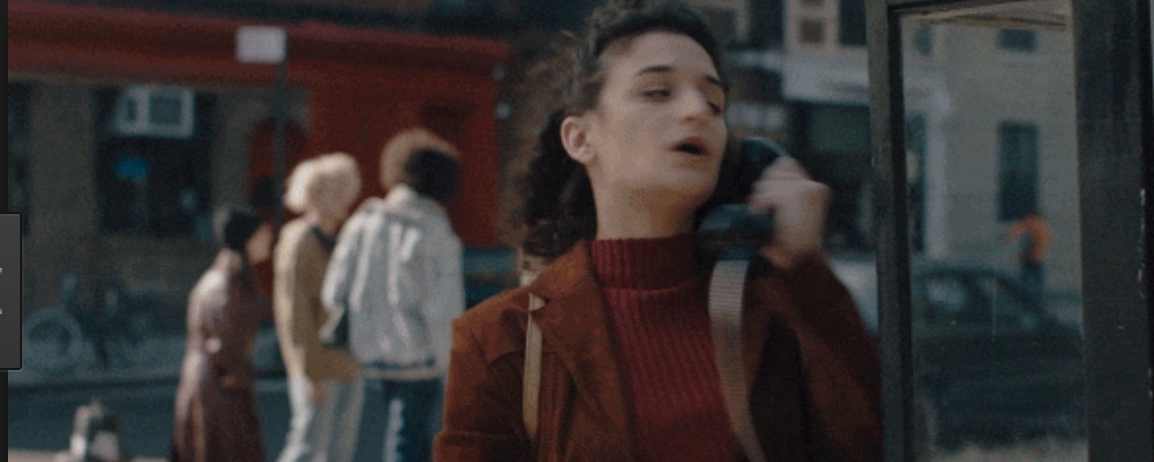Gillian Robespierre’s second feature film, Landline, is, in many ways, in keeping with the tone of her first, Obvious Child. And it isn’t just because both star her seeming muse, Jenny Slate. No, more than that, Landline is a continuation in theme of the existential crises that tend to befall each of us when a certain irrevocable phase of our lives is about to commence. For Dana Jacobs (Slate), that irrevocability stems from getting ever closer to having to marry her fiancé, Ben (Jay Duplass, always happy to play the role of chump). Feeling stuck in the monotony of knowing exactly what’s going to happen every night–likely going to Blockbuster and renting something like Curly Sue or simply watching “must-see TV” like Mad About You–Dana begins to panic.
As you can probably tell from the previous pop culture references, Landline takes place in the 90s, specifically 1995. And though there’s no shortage of homages to a period evermore romanticized–in New York and in general–by those who didn’t live through it, Robespierre makes it abundantly clear that the emotional challenges of the present aren’t so different from the past. As is the case with the matriarch of the family, Pat (Edie Falco, consistently ideal as the wife done wrong), whose zeal for her husband, Alan (John Turturro, in an understated performance), has noticeably waned. His failure as a playwright still hasn’t seemed to hit him in spite of serving as a copywriting shill for McCann Erickson. But this is the least of Pat’s worries as she struggles to enforce the rules for her other daughter, teenage Ali (Abby Quinn), a rebellious sort in direct contrast to her lid-on-so-tight older sister.
Coming back home one night after sneaking out to a rave, Ali accidentally unlocks (via a floppy disk) a number of explicit love letters from her father to the mysteriously named C. Horrified by her revelation of her father’s affair, Ali flees to their family’s country home to have sex with her boyfriend, Jed (Marquis Rodriguez)–the type of dreamboat who asks questions like, “You wanna get high and watch Zelig?” Dana, in the meantime, has engaged in some high-risk behavior in terms of jeopardizing her relationship with Ben, finding the irresistibility of an old flame, Nate (Finn Wittrock), too difficult to pass up.
It is thusly that Dana summarily interrupts Ali’s “away time” by showing up unannounced. Scandalized by her sister’s cavalier behavior in bringing Jed to the house, she demands that Ali take him to the train station. Of course, it is Dana who ends up driving since Ali only has her learner’s permit. As Dana tries to provide some source of authoritarian chiding toward her younger sibling, Ali throws it back in her face when she asks if Ben knows where she is this weekend. Dana insists that’s it’s different, as she isn’t a child who ran away from home. Scoffing, Ali returns, “I did not run away from home, I went to our family’s country house. How much more vanilla can that scenario get?” So begins their weekend of sisterly bonding, whereupon Ali tells Dana about their father’s affair with C and Dana tells Ali about her own with Nate.
Upon returning together to New York, Dana decides to stay in her family’s home under the guise of “being there” for Ali while they wait for the inevitable fallout to come over his infidelity. At least, that’s what she gives Ben as an excuse. In truth, this is the perfect way for her to avoid continuing down the path of a life she’s carved out for herself that she’s no longer even sure she wants. Accordingly, she keeps her own cheating going while away from her apartment with Ben–soul searching through penis experimenting, as it were.
In typical Robespierre fashion, there isn’t an easy answer that provides a quick fix or an immediate solution (as was the case in Obvious Child) to the woes of the Jacobs family. No, this eventual auteur prefers to leave her endings as messy and incomplete as they would be in real life. And that’s something that no decade–no matter how much or how little technology–can change with regard to the human condition.





















